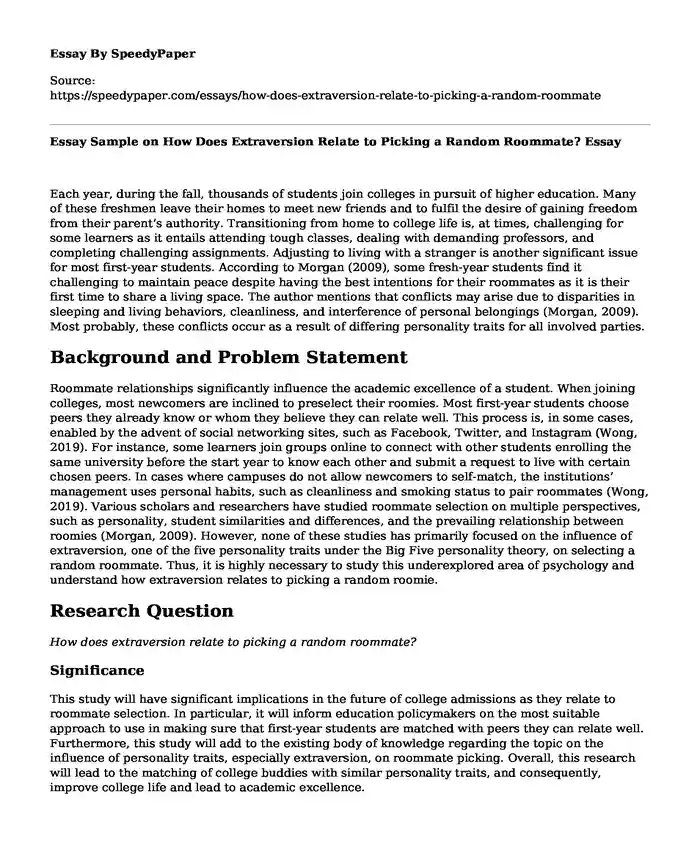
| Essay type: | Problem solution essays |
| Categories: | College Personality Relationship |
| Pages: | 3 |
| Wordcount: | 656 words |
Each year, during the fall, thousands of students join colleges in pursuit of higher education. Many of these freshmen leave their homes to meet new friends and to fulfil the desire of gaining freedom from their parent’s authority. Transitioning from home to college life is, at times, challenging for some learners as it entails attending tough classes, dealing with demanding professors, and completing challenging assignments. Adjusting to living with a stranger is another significant issue for most first-year students. According to Morgan (2009), some fresh-year students find it challenging to maintain peace despite having the best intentions for their roommates as it is their first time to share a living space. The author mentions that conflicts may arise due to disparities in sleeping and living behaviors, cleanliness, and interference of personal belongings (Morgan, 2009). Most probably, these conflicts occur as a result of differing personality traits for all involved parties.
Background and Problem Statement
Roommate relationships significantly influence the academic excellence of a student. When joining colleges, most newcomers are inclined to preselect their roomies. Most first-year students choose peers they already know or whom they believe they can relate well. This process is, in some cases, enabled by the advent of social networking sites, such as Facebook, Twitter, and Instagram (Wong, 2019). For instance, some learners join groups online to connect with other students enrolling the same university before the start year to know each other and submit a request to live with certain chosen peers. In cases where campuses do not allow newcomers to self-match, the institutions’ management uses personal habits, such as cleanliness and smoking status to pair roommates (Wong, 2019). Various scholars and researchers have studied roommate selection on multiple perspectives, such as personality, student similarities and differences, and the prevailing relationship between roomies (Morgan, 2009). However, none of these studies has primarily focused on the influence of extraversion, one of the five personality traits under the Big Five personality theory, on selecting a random roommate. Thus, it is highly necessary to study this underexplored area of psychology and understand how extraversion relates to picking a random roomie.
Research Question
How does extraversion relate to picking a random roommate?
Significance
This study will have significant implications in the future of college admissions as they relate to roommate selection. In particular, it will inform education policymakers on the most suitable approach to use in making sure that first-year students are matched with peers they can relate well. Furthermore, this study will add to the existing body of knowledge regarding the topic on the influence of personality traits, especially extraversion, on roommate picking. Overall, this research will lead to the matching of college buddies with similar personality traits, and consequently, improve college life and lead to academic excellence.
Research Design and Methods
This study will use a quantitative research approach to collect data. Being a quantitative study, the researcher will use questionnaires to gather useful and relevant information, which will be analyzed and used to make informed conclusions. The questionnaire design will have close-ended questions similar to a Likert scale, which is often used in measuring attitudes (Roopa & Satya, 2012). This research design was selected because apart from being inexpensive, it ensures the protection of participants’ privacy. This scenario implies that respondents will provide honest answers to asked questions. Moreover, the findings from a quantitative study can be correlated with those of other similar studies (Roopa & Satya, 2012). The collected data will be cross-tabulated, and the results filtered. The numbers will be crunched and meaningful conclusions made.
References
Morgan, C. (2009). Effects of personality preferences and perceptions of others’ conflict styles impact on roommate satisfaction. Communication and Theater Association of Minnesota Journal, 36, 52-69. https://cornerstone.lib.mnsu.edu/cgi/viewcontent.cgi?article=1030&context=ctamj
Roopa, S., & Rani, M. S. (2012). Questionnaire designing for a survey. The Journal of Indian Orthodontic Society, 46(4), 273-277. https://www.researchgate.net/publication/235801675_Questionnaire_Designing_for_a_Survey
Wong, A. (2019, August 26). Colleges would rather freshmen not choose their roommates. The Atlantic. https://www.theatlantic.com/education/archive/2019/08/colleges-dont-want-freshmen-choosing-their-roommates/596803/
Cite this page
Essay Sample on How Does Extraversion Relate to Picking a Random Roommate?. (2023, Aug 21). Retrieved from https://speedypaper.net/essays/how-does-extraversion-relate-to-picking-a-random-roommate
Request Removal
If you are the original author of this essay and no longer wish to have it published on the SpeedyPaper website, please click below to request its removal:
- Management of People - HRM Essay Sample
- Free Essay: Practicum Project Plan to Increase Engagement in Staff Meetings
- Abstaining From THC - Paper Example
- Paper Example on Performance Appraisals as a Function of Human Resource
- Essay Sample on Initiatives to Improve Ethical Commitment
- Paper Example. The Developmental Stages
- Academic Analysis Sample: Why Nature and Nurture Won't Go Away
Popular categories




